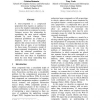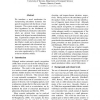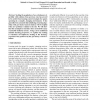443 search results - page 32 / 89 » Learning from a Population of Hypotheses |
SAINT
2005
IEEE
14 years 3 months ago
2005
IEEE
Inductive Logic Programming (ILP) is a combination of inductive learning and first-order logic aiming to learn first-order hypotheses from training examples. ILP has a serious b...
CEC
2009
IEEE
14 years 4 months ago
2009
IEEE
—Structure learning is a crucial component of a multivariate Estimation of Distribution algorithm. It is the part which determines the interactions between variables in the proba...
COLING
2008
13 years 11 months ago
2008
A noun-compound is a compressed proposition that requires an audience to recover the implicit relationship between two concepts that are expressed as nouns. Listeners recover this...
ACL
2010
13 years 8 months ago
2010
We introduce a novel mechanism for incorporating articulatory dynamics into speech recognition with the theory of task dynamics. This system reranks sentencelevel hypotheses by th...
CEC
2005
IEEE
14 years 3 months ago
2005
IEEE
Abstract- Seeding the population of an evolutionary algorithm with solutions from previous runs has proved to be useful when learning control strategies for agents operating in a c...



